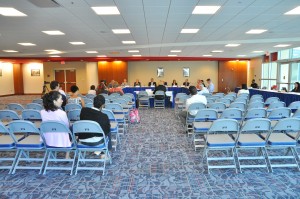
The job isn’t posted online anywhere — there isn’t a final description of the work involved — there isn’t even a concrete timetable for when FAU wants the position filled, but a search committee is actively looking for the university’s seventh president.
Last Wednesday, Sept. 25, a 15-member board met for the first time in the recruitment room of FAU’s football stadium. After its first meeting, the group agreed its ideal candidate is someone with “leadership, vision, passion, versatility, innovation and openness.”
The search starts four months after former FAU President Mary Jane Saunders resigned from her position to return to the faculty in the College of Science, amid a series of controversies involving a car accident where she hit a student protester on the Jupiter campus, drove away without being charged and later demanded an apology from the victim.
Since then, Dennis Crudele has acted as the interim president after spending three years as the senior vice president for Financial Affairs, and twenty three more rising up the ranks of the university’s administration. But Crudele says he’s not interested in sticking around, is not on the committee and is also a member of the Deferred Retirement Option Program.
<<The Start>>
The first meeting of the Presidential Search Committee — which is four members larger than the group that selected Saunders and made up of five Trustees, endowment board members, administrators, faculty, staff, community members and a single student — ended with little more than a rough outline of their ideal candidate. Their desires were jotted down by Laurie Wilder, the executive vice president and managing director of Parker Executive Search, the company being paid to find job candidates.
“The pool is the pool, I don’t create it, but I have to fish in it,” Wilder said as she listened to the committee members list their hopes for candidates.
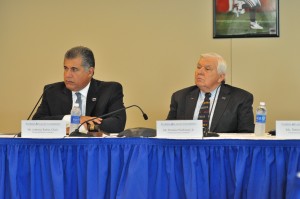
Similar qualifications came from Dean of Students Corey King and the Faculty Senate President Ronald Nyhan, who both emphasised a willingness to let the students and faculty have a say in decision-making.
“A candidate that is student-centered, that see students as a core value to the academy,” said King. ”That student voices are heard, that students are engaged and that there is a shared governance in the university community.”
King and Nyhan’s desire are in line with the Search Committee Chair and Board of Trustees Chair Anthony Barbar, who told the UP what he wanted out of FAU’s next president when Saunders resigned in May.
“We’re looking for somebody that’s going to build on the trajectory that [Saunders] started,” Barbar said. “We’ll be looking for somebody with vision, somebody that’s able to deal with the various stakeholders in the university: students, faculty, administrators, community, donors. And somebody that’s decisive, able to make a decision and have a clear vision of what the future is for Florida Atlantic University.”
King emphasised a candidate who could communicate well with the students specifically.
“We need someone who will be able to come in and bring a sense of meaningful conversation and dialogue to that diverse community [the student body],” said King.
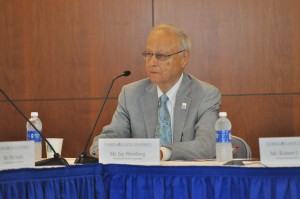
Building off of King’s suggestions, Associate Dean of the College of Medicine Dr. Julie Servoss acknowledged the role of good communication skills, but singled out two other qualities for an ideal selection candidate:
“We all talk about excellent communication skills, but I think beyond that, a president will need to demonstrate adaptability and the ability to understand the culture of FAU at all levels,” Servoss said. “What is the environment? What is the cultural ambience and the strengths at the student level, the faculty level, the administrative level. What is FAU and who are we?”
Other committee members, however, focused on good public relations judgement, referring to the controversies of spring 2013 semester, like the botched $6 million stadium naming rights deal with the private prison company, the GEO Group, as well as the academic freedom debates and protests concerning Communications professors James Tracy and Deandre Poole.
“Because we are a diverse university, should be and want to be, that doesn’t mean that we tolerate bigotry or prejudice. You have to draw a keen distinction between free speech and hate speech,” FAU Foundation Board Vice Chair Jay Weinberg said. ”I think that [in light of] recent events at this university, we need a president that understands that and who will act decisively with respect to it.”
<<Looking and looking>>
The committee didn’t determine how long it will take to find a president who can distinguish free speech from hate speech in its first hour-and-a-half meeting.
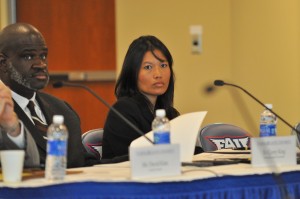
“That timeline has not been finalized yet, but will be shortly,” Wilder said. She later clarified with, “I’m not a believer that these processes have to take forever.”
The search committee, with its eventual decision, will hire someone who will be in the position to fill several other administrative posts, including provost, associate provost and vice presidential offices.
“Whoever comes in here is going to have the fortunate opportunity to be able to pick their own provost, amongst other positions,” said Student Body President Peter Amirato.
“We have a number of key positions that are in interim stages, that whoever we hire as president is going to be able to come here and pick the non-interim [people] to serve in those positions.”
Amirato, the only student on FAU’s Board of Trustees — the 13 appointed officials who will approve the President’s contract when the search committee narrows its list of candidates — wants someone who understands the university.
“We need someone who understands FAU, understands our demographic, what makes up our student body,” Amirato said. “Someone that can leave a strong presence in the community and maintain the vision of FAU… We need someone [who] has an idea of how they’re going to help us reach that goal.”
[divider type=”thin”]
<<The Searchers>>
Parker Executive Search is an Atlanta-based executive search firm which has a history of finding leadership candidates for academic institutions, athletic and health science organizations and corporations. In the past year alone, Parker has conducted six searches for the university president positions at other universities; Parker’s higher-education clientele in the past four years have included the University of West Georgia and the University of North Carolina, Wilmington, among others.
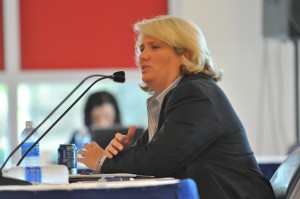
Laurie Wilder, the executive vice president and managing director for the company, outlined the strategy of the search at the first committee meeting which included advertising, contacting potential candidates already employed at other institutions and bringing the best candidates to FAU for tours of the campus and evaluations.
“We believe in a very proactive approach,” Wilder said.
Parker Executive Search, as part of its contract with FAU, cannot receive more than $90,000 as payment. While Parker will locate the candidates for the presidential search, its involvement begins and ends with the candidates. It does not have a say in the actual selection process.
“My job is to aggressively recruit, facilitate and advise,” Wilder said, regarding the company’s level of involvement in the search, “but we do not have a vote in this process.”
Parker Executive Search was selected to conduct the search during the August BOT meeting after the Board grew dissatisfied with the previous search company R. William Funk & Associates.
“I don’t think we should go with the same company that gave us losers,” Trustee Jeffrey Feingold said.
Parker was selected as part of a “clean slate” that Trustee David Feder spoke about. Parker was previously implicated in controversies surrounding selecting candidates for positions at Rutgers University.
[divider type=”thin”]
<<Two Students, One President>>
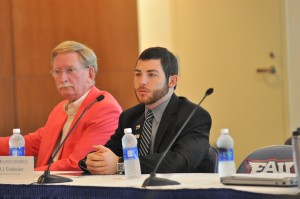
Andrew “AJ” Einbinder, a senior communications major, is the sole student sitting on the FAU Presidential Search Committee. The UP asked Einbinder how he was chosen:
“I was asked by BOT Chair Anthony Barbar,” Einbinder said of the decision made about a month ago. That was after Einbinder was recommended by the Senior Vice President of Student Affairs Charles Brown.
“I would like this person to be friendly, creative, approachable, honest, committed,” Einbinder said of his ideal seventh president. “The ability to inspire the university and unlock its growing potential.”
He was satisfied with the first meeting and believes the other search committee members are all looking for the same things.
“It explained everything perfectly. Everyone on the committee explained what they are looking for and while it was phrased differently by each member we are all on the same foot and understand what we are looking for, which is what is most important,” he said. “So it is because we have this direction and are on the same foot that we will be able to move forward… This will be a great experience in finding a new leader for our university.”
Peter Amirato, the Student Body President who sits on the BOT and will approve the next president’s contract, explained why he is not sitting on the search committee.
“I’m not on the presidential search committee because we thought it would be best to get two students’ voices instead of one,” Amirato said. “I already get to vote at the Board level, and it doesn’t hurt to diversify the opinion a little more.”











